Module 5 Lao She Teahouse 知识点讲练课件(共40张PPT) 外研版英语八年级上册
文档属性
| 名称 | Module 5 Lao She Teahouse 知识点讲练课件(共40张PPT) 外研版英语八年级上册 |
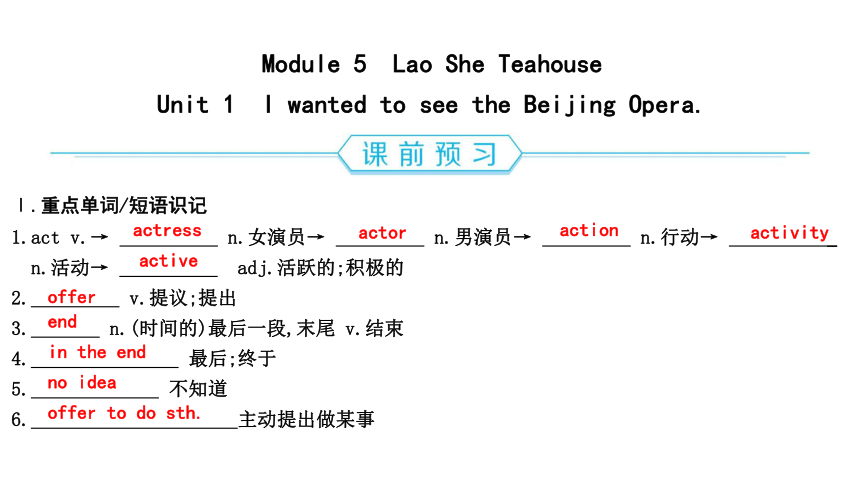
|
|
| 格式 | pptx | ||
| 文件大小 | 466.8KB | ||
| 资源类型 | 教案 | ||
| 版本资源 | 外研版 | ||
| 科目 | 英语 | ||
| 更新时间 | 2024-07-04 16:14:07 | ||
图片预览

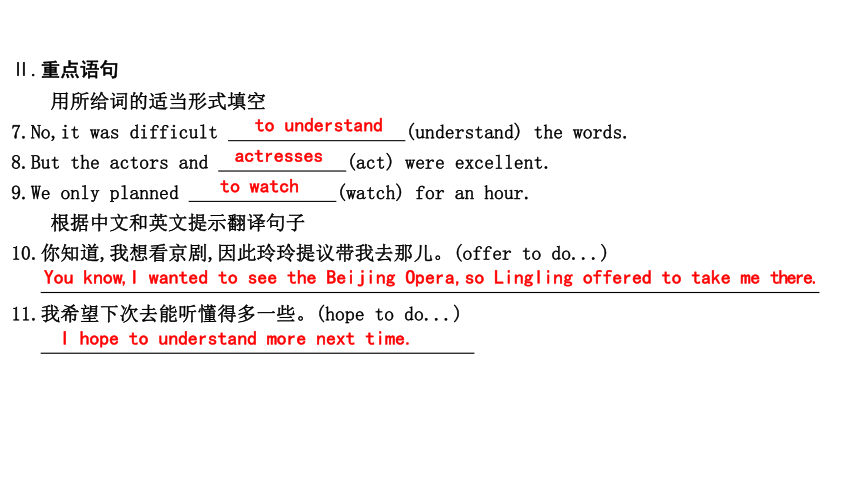
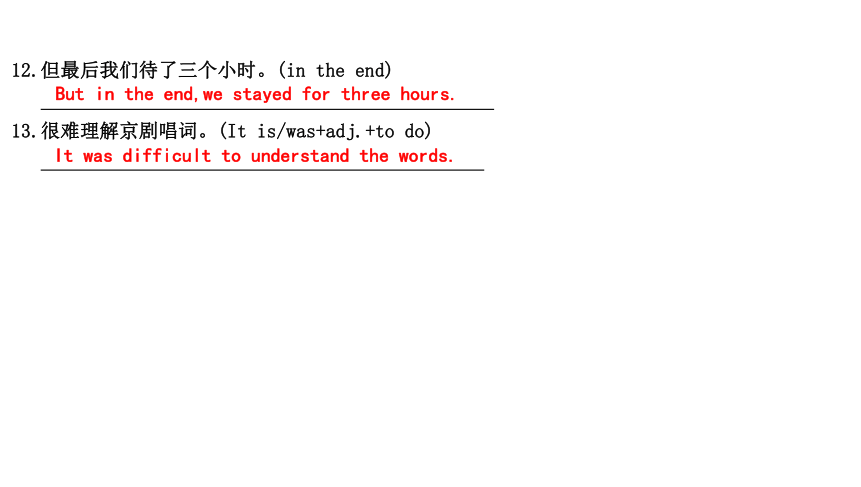
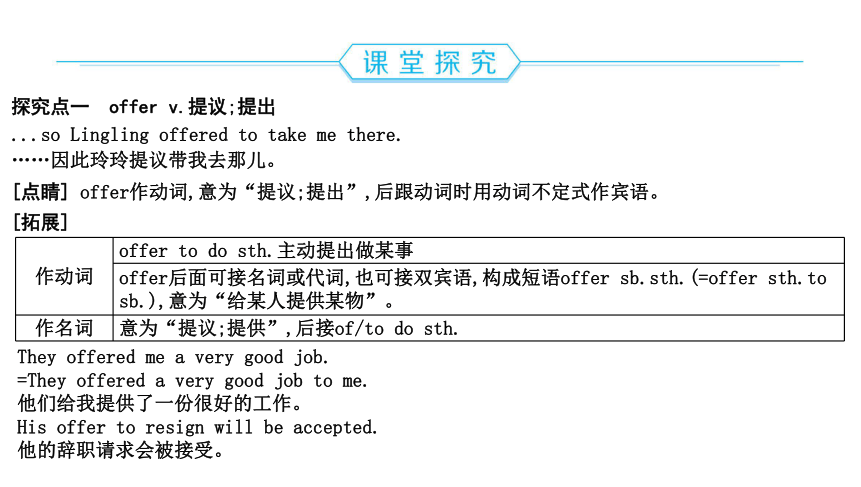


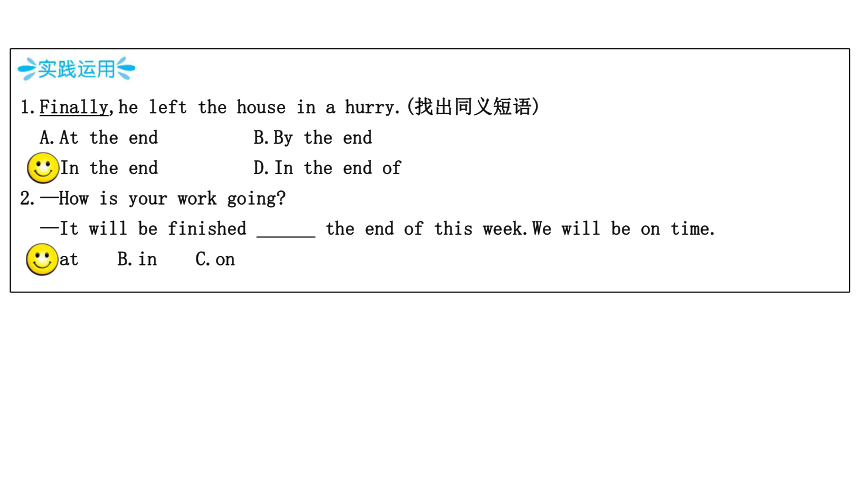
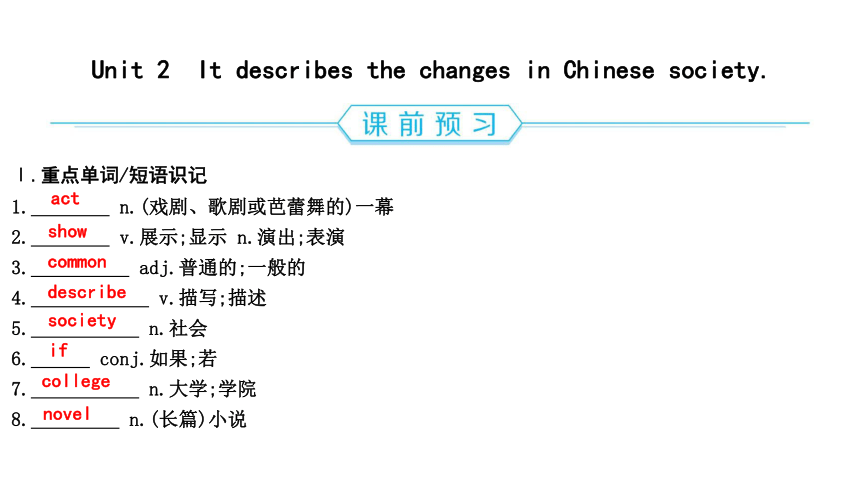
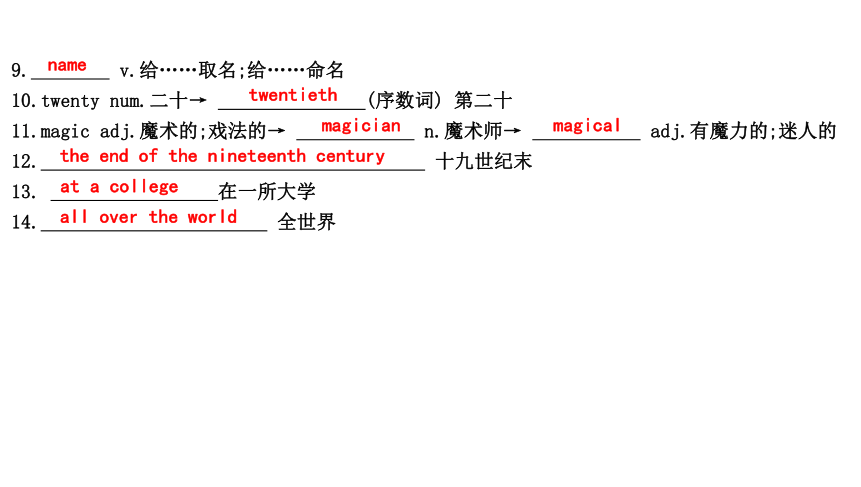
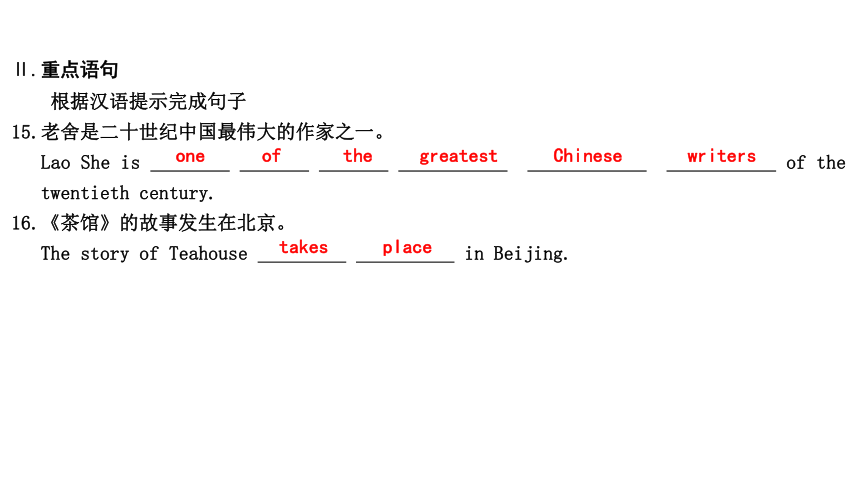
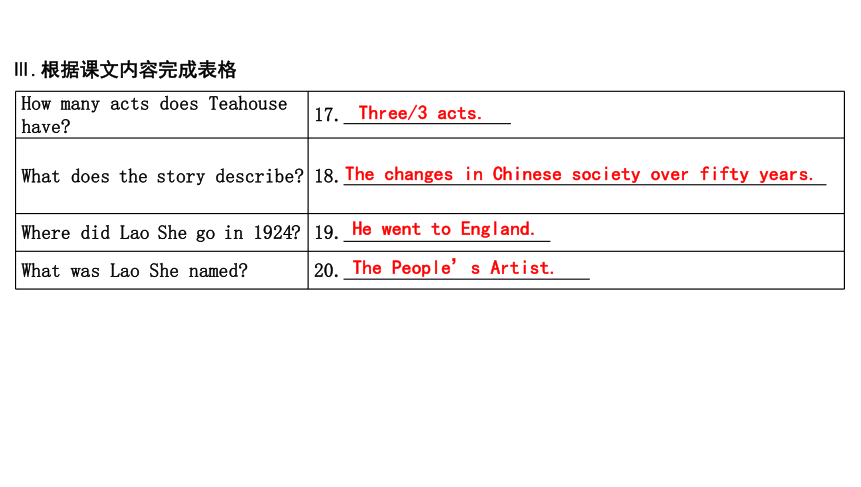
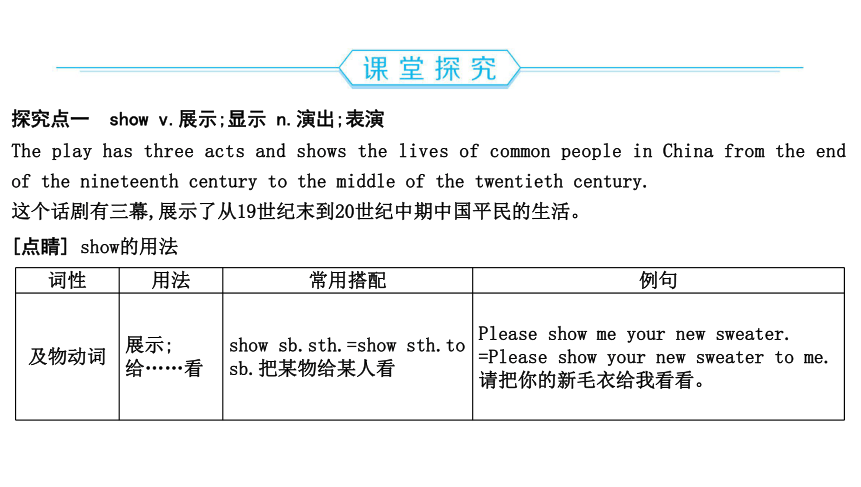
文档简介
(共40张PPT)
1.act v.→ n.女演员→ n.男演员→ n.行动→ _
n.活动→ adj.活跃的;积极的
2. v.提议;提出
3. n.(时间的)最后一段,末尾 v.结束
4. 最后;终于
5. 不知道
6. 主动提出做某事
Module 5 Lao She Teahouse
Unit 1 I wanted to see the Beijing Opera.
actress
actor
action
activity
Ⅰ.重点单词/短语识记
active
offer
end
in the end
no idea
offer to do sth.
用所给词的适当形式填空
7.No,it was difficult (understand) the words.
8.But the actors and (act) were excellent.
9.We only planned (watch) for an hour.
根据中文和英文提示翻译句子
10.你知道,我想看京剧,因此玲玲提议带我去那儿。(offer to do...)
11.我希望下次去能听懂得多一些。(hope to do...)
to understand
actresses
to watch
You know,I wanted to see the Beijing Opera,so Lingling offered to take me there.
Ⅱ.重点语句
I hope to understand more next time.
12.但最后我们待了三个小时。(in the end)
13.很难理解京剧唱词。(It is/was+adj.+to do)
But in the end,we stayed for three hours.
It was difficult to understand the words.
探究点一 offer v.提议;提出
...so Lingling offered to take me there.
……因此玲玲提议带我去那儿。
[点睛] offer作动词,意为“提议;提出”,后跟动词时用动词不定式作宾语。
[拓展]
作动词 offer to do sth.主动提出做某事
offer后面可接名词或代词,也可接双宾语,构成短语offer sb.sth.(=offer sth.to sb.),意为“给某人提供某物”。
作名词 意为“提议;提供”,后接of/to do sth.
They offered me a very good job.
=They offered a very good job to me.
他们给我提供了一份很好的工作。
His offer to resign will be accepted.
他的辞职请求会被接受。
1.我们可以在某些方面主动帮助他们。
We can help them in some ways.
2.谢谢你为我们提供了这么多有趣的书籍。
offer
to
Thank you for offering us so many interesting books./Thank you for offering so
many interesting books to us.
探究点二 in the end最后;终于
We only planned to watch for an hour,but in the end,we stayed for three hours.我们仅仅计划看一个小时,但是最后我们待了三个小时。
[点睛] in the end意为“最后;终于”,相当于at last和finally,只表示时间概念。
at the end of 表示“在……的末端;在……的末期”,既可以指位置的末端,又可指时间的末期
At the end of the road,you can see the hospital.
在路的尽头,你可以看到医院。
by the end of 表示“到……末为止”,仅表示时间概念,常与完成时连用
By the end of this term,we have learnt 1,000 words.
到这学期末,我们已经学了1 000个单词。
1.Finally,he left the house in a hurry.(找出同义短语)
A.At the end B.By the end
C.In the end D.In the end of
2.—How is your work going
—It will be finished the end of this week.We will be on time.
A.at B.in C.on
1. n.(戏剧、歌剧或芭蕾舞的)一幕
2. v.展示;显示 n.演出;表演
3. adj.普通的;一般的
4. v.描写;描述
5. n.社会
6. conj.如果;若
7. n.大学;学院
8. n.(长篇)小说
Unit 2 It describes the changes in Chinese society.
act
show
common
describe
Ⅰ.重点单词/短语识记
society
if
college
novel
9. v.给……取名;给……命名
10.twenty num.二十→ (序数词) 第二十
11.magic adj.魔术的;戏法的→ n.魔术师→ adj.有魔力的;迷人的
12. 十九世纪末
13. 在一所大学
14. 全世界
name
twentieth
magician
magical
the end of the nineteenth century
at a college
all over the world
根据汉语提示完成句子
15.老舍是二十世纪中国最伟大的作家之一。
Lao She is of the
twentieth century.
16.《茶馆》的故事发生在北京。
The story of Teahouse in Beijing.
one
of
the
greatest
Ⅱ.重点语句
Chinese
writers
takes
place
Ⅲ.根据课文内容完成表格
How many acts does Teahouse have 17.
What does the story describe 18.
Where did Lao She go in 1924 19.
What was Lao She named 20.
Three/3 acts.
The changes in Chinese society over fifty years.
He went to England.
The People’s Artist.
探究点一 show v.展示;显示 n.演出;表演
The play has three acts and shows the lives of common people in China from the end of the nineteenth century to the middle of the twentieth century.
这个话剧有三幕,展示了从19世纪末到20世纪中期中国平民的生活。
[点睛] show的用法
词性 用法 常用搭配 例句
及物动词 展示; 给……看 show sb.sth.=show sth.to sb.把某物给某人看 Please show me your new sweater.
=Please show your new sweater to me.
请把你的新毛衣给我看看。
及物动词 带领; 引领 show sb.to... 带某人去…… show sb. around...带某 人参观…… Please show me to his home.请带我到他家去。
Please show us around your school.请带我们参观你(们)的学校。
说明; 表明 The report shows the company’s present
situation.这份报告表明了公司当前的状况。
名词 展览; 展览会 on show 在展览 All the books are on show.所有的图书在展览。
节目 talk show 访谈节目 Do you usually watch talk shows
你经常看访谈节目吗
1.Please show me your new pen.(改为同义句)
Please your new pen me.
2.我们学校将举办一次访谈节目。
There is going to be in our school.
show
to
a talk show
探究点二 “one of+the/其他限定词+形容词最高级+名词复数”
Lao She is one of the greatest Chinese writers of the twentieth century.
老舍是二十世纪中国最伟大的作家之一。
[点睛] “one of+the/其他限定词+形容词最高级+名词复数”指在某一范围内“最……的……之一”。该结构作主语时,谓语动词用单数形式。
1.Teahouse is one of plays.
A.the Lao She’s most famous
B.Lao She’s the most famous
C.the more famous
D.Lao She’s most famous
2.One of the best plays Teahouse still popular among the old today.
A.be B.is C.are D.was
探究点三 if conj.如果;若
If you like the Beijing Opera,traditional music or magic shows,you can enjoy them at the teahouse.
如果你喜欢京剧、传统音乐或魔术表演,你可以在这家茶馆里欣赏到它们。
[点睛] if 作连词,意为“如果”,引导条件状语从句,该从句用一般现在时,主句常用一般将来时。
[拓展] if还可意为“是否”,引导宾语从句,时态根据实际情况来定。例如:
I want to know if she will come to the party tonight.
我想知道她是否会来参加今晚的聚会。
1.—Let’s go fishing if it this weekend.
—But nobody knows if it .
A.is fine;will rain
B.will be fine;rains
C.will be fine;will rain
D.is fine;rains
2.If I have enough money,I a school bus to help more children go to school.
A.buy B.bought
C.will buy D.have bought
( )1. the road,you’ll find the hospital.
A.In the end of B.By the end of
C.At the end of D.In the end
( )2.The parents planned with their child.
A.talk B.to talk
C.talking D.to talking
( )3.Jack is one of my friends.
A.best B.better
C.the best D.the better
Unit 3 Language in use
C
B
A
Ⅰ.单项选择
( )4.Did they decide the job Joe
A.offer;in B.to offer;with
C.to offer;to D.offer;to
( )5.I heard you bought a new book.Can you
A.show me for it B.show it for me
C.show it to me D.show it me
C
C
根据短文内容,从短文后的选项中选出能填入空白处的最佳选项。选项中有两项为多余选项。
Storytelling has caught the human imagination(想象力) for
thousands of years.People started telling stories long before writing was invented.6. But people all over the world still tell one another stories out loud.A person who can tell a good story nearly always finds listeners.
Before people developed writing,storytelling was the most important way to pass down information.Anything a culture wanted to protect had to be told out loud.Each generation would tell the culture’s stories to the next.7. Knowledge passed down in this method is called the spoken tradition.Even cultures that people know how to write still pass down some information in this way.
Ⅱ.任务型阅读
E
A
8. In other cultures only special storytellers were entrusted(委托) to do this important job.A culture’s best storytellers had good memories.They could also make the stories very interesting,so people would listen and remember them.Sometimes people would sing the stories or tell them in the form(形式) of poems.9.
However,stories told aloud change over time as different people tell them.A storyteller might change a story in order to make it better.Unlike written stories,
the spoken tradition is not created by any one person.10. Sometimes the stories are collected and written down long after they have been created.
B
C
D
A.In this way the stories were passed down.
B.In some cultures everyone would pass down the stories.
C.Songs and poems can both make stories easier to remember.
D.Instead,a whole culture helps shape the changing stories throughout history.
E.Today stories are also written down in books and acted out in movies,TV shows,and
plays.
F.Stories are popular with many young people.
G.Do you like stories
本模块的话题是“娱乐:戏剧和电影”。本模块我们学习了如何介绍一部文学作品,例如戏剧、电影等。现在就让我们用所学的知识写一篇短文来介绍自己喜欢的文学作品吧!
模块写作指导
1.话题词汇
(1)我最喜欢的话剧是《茶馆》。
My favourite play is Teahouse.
(2)这个故事发生在巴黎。
This story happened in Paris.
(3)电影中最好的部分是音乐。
The best part of the film is the music.
(4)它赢得了很多孩子的心。
It wins the hearts of many children.
2.常用句型
1.写作要求
请你根据以下写作要点,以“My Favourite Cartoon”为题写一篇短文,介绍一下这个故事。80词左右,短文的开头已给出,不计入总词数。
写作要点:
参考词汇:win the hearts of赢得……的心
故事发生地 澳大利亚
主角 小丑鱼(clownfish) 父子
剧情摘要 Nemo父子在海里过着快乐的生活。有一天,一艘渔船把儿子Nemo带走了,父亲Marlin决定去找他,并最终救了自己的儿子。
最佳推荐 配乐
观众评论 有趣;Nemo很可爱,赢得了很多孩子的心。
2.思路点拨
(1) 体裁:说明文
(2) 人称:第三人称
(3) 时态:一般现在时
(4) 写作导图
3.范文借鉴
My Favourite Cartoon
My favourite cartoon is a story about the father clownfish and his son.The story happens in Australia.Nemo and his father live happily in the sea.One day,a fishing boat takes Nemo away.So his father Marlin decides to look for Nemo.In the end,he saves his son.The best part of the cartoon is the music.It sounds great.
Many people think the story is interesting and Nemo is so lovely that it wins the hearts of many children.
假如你是北京一所国际学校的学生李华,你的美国同学Mike对中国的京剧很感兴趣,所以你决定邀请他去欣赏京剧。请根据以下提示,用英语给他写一封电子邮件。
1.时间:周六下午
2.地点:老舍茶馆
3.内容:看京剧和魔术表演,品尝传统美食……
4.意义:了解中国传统文化
参考词汇:传统的 traditional 文化 culture
注意:
1.词数70左右;
2.可适当增加细节,以使行文连贯;
3.邮件中不能出现与本人相关的信息;
4.开头和结尾已为你写好,不计入总词数。
Dear Mike,
I’m so glad that you are interested in the Beijing Opera and I’m interested in it,too.
I’m looking forward to your reply!
Yours,
Li Hua
One possible version:
Dear Mike,
I’m so glad that you are interested in the Beijing Opera and I’m interested in it,too.I want to invite you to enjoy it together.
The Beijing Opera is very popular in China.It has a history of more than 200 years.We will meet at Lao She Teahouse on Saturday afternoon to watch it.Besides,we can watch some magic shows,which is a best way for you to relax.If you are hungry,
we’ll go to the restaurant to taste some traditional Chinese food such as Beijing Roast Duck.I hope you can enjoy yourself and have a better understanding of traditional Chinese culture.
I’m looking forward to your reply!
Yours,
Li Hua
模块语法突破
动词不定式(1)和双宾语
一、动词不定式(1)
1.动词不定式概述
动词不定式的基本形式是“to+动词原形”,在某些动词后要省略动词不定式符号to。动词
不定式没有人称和数的变化,在句子中不能作谓语。动词不定式仍保留动词的特点,即可以有自
己的宾语和状语。动词不定式同它的宾语或状语构成不定式短语。
2.动词不定式作宾语
动词不定式位于及物动词后作宾语,常表示意图、希望或决定的内容等。常跟动词不定式
作宾语的动词有want,decide,like,love,agree,offer,try,begin,start,learn,wish,hope,
plan,fail,refuse,expect等。例如:
I want to be a doctor.我想当一名医生。
3.feel,find,make,think,believe等动词,如果有动词不定式作宾语,补语是形容词或名词时,常
用it作形式宾语,把动词不定式后移。例如:
I find it easy to learn English.
我发现学英语很容易。
4.某些动词后既可用动词不定式也可用v.-ing形式作宾语,意义差别不大。用动词不定式表示动
作意味强一些。这些动词有like,love,begin,start,hate 等。例如:
I like to take/taking a walk in the neighbourhood after supper.
我喜欢晚饭后在社区内散步。
Some children begin to learn/learning English under three.一些孩子不到三岁就开始学
英语。
5.有些动词既可接不定式作宾语,也可接v.-ing形式作宾语,但意义不同。
[温馨提示] 有些动词一般不接动词不定式作宾语,而是接动词-ing形式作宾语,常用的单词有
enjoy,finish,practise,keep等。
二、双宾语
在英语中,有些及物动词可接两个宾语(双宾语),即指人的间接宾语和指物的直接宾语。常用句型为“主语+及物动词+间接宾语+直接宾语”;有时间接宾语也可改为由介词to或for构成的短语,放在直接宾语的后面。句型为“主语+及物动词+直接宾语+介词+间接宾语”。
1.可以接双宾语且能用to来转换的常用词有give,tell,send,write,pass,offer,show等。例如:
Our teacher told us an interesting story./Our teacher told an interesting story to
us.
我们老师给我们讲了一个有趣的故事。
2.可以接双宾语且能用for来转换的常用词有buy,get,find,make,order等。例如:
My father will buy me a new pen tomorrow./My father will buy a new pen for me tomorrow.
我爸爸明天要给我买一支新钢笔。
3.下列情况常用“直接宾语+介词+间接宾语”结构:
(1)当直接宾语是人称代词时。
They picked up some pens and handed them to the little boy.他们捡起一些钢笔,并递给了
那个小男孩。
(2)当间接宾语比直接宾语长时。
I’ll pass the message to the people who live around us.我要把信息传给生活在我们周围
的人。
(3)需要强调间接宾语时。
You should give the key to your father.
你应该把钥匙给你爸爸。
1.The man wishes (travel) around the world.
2.Why not offer (help) your mother with some housework
3.They decided (pay) nothing for the terrible meal.
4.We’ll learn (sing) a beautiful English song tomorrow.
5.Our Chinese teacher always encourages us (read) more books.
6.Mr Wang asked us (not play) in the busy street after school.
to travel
to help
Ⅰ.用所给词的适当形式填空
to pay
to sing
to read
not to play
( )7.My parents always tell me more vegetables and fruit.
A.eat B.to eat
C.ate D.eats
( )8.When I was young,my parents taught me older people kindly.(2021天津)
A.treats B.to treat
C.treated D.treat
( )9.—Did you decide a bicycle to school
—Sure.
A.ride B.riding
C.to ride D.rode
B
Ⅱ.单项选择
C
B
拼 搏 奋 斗 励 志 笃 行
谢谢观赏!
1.act v.→ n.女演员→ n.男演员→ n.行动→ _
n.活动→ adj.活跃的;积极的
2. v.提议;提出
3. n.(时间的)最后一段,末尾 v.结束
4. 最后;终于
5. 不知道
6. 主动提出做某事
Module 5 Lao She Teahouse
Unit 1 I wanted to see the Beijing Opera.
actress
actor
action
activity
Ⅰ.重点单词/短语识记
active
offer
end
in the end
no idea
offer to do sth.
用所给词的适当形式填空
7.No,it was difficult (understand) the words.
8.But the actors and (act) were excellent.
9.We only planned (watch) for an hour.
根据中文和英文提示翻译句子
10.你知道,我想看京剧,因此玲玲提议带我去那儿。(offer to do...)
11.我希望下次去能听懂得多一些。(hope to do...)
to understand
actresses
to watch
You know,I wanted to see the Beijing Opera,so Lingling offered to take me there.
Ⅱ.重点语句
I hope to understand more next time.
12.但最后我们待了三个小时。(in the end)
13.很难理解京剧唱词。(It is/was+adj.+to do)
But in the end,we stayed for three hours.
It was difficult to understand the words.
探究点一 offer v.提议;提出
...so Lingling offered to take me there.
……因此玲玲提议带我去那儿。
[点睛] offer作动词,意为“提议;提出”,后跟动词时用动词不定式作宾语。
[拓展]
作动词 offer to do sth.主动提出做某事
offer后面可接名词或代词,也可接双宾语,构成短语offer sb.sth.(=offer sth.to sb.),意为“给某人提供某物”。
作名词 意为“提议;提供”,后接of/to do sth.
They offered me a very good job.
=They offered a very good job to me.
他们给我提供了一份很好的工作。
His offer to resign will be accepted.
他的辞职请求会被接受。
1.我们可以在某些方面主动帮助他们。
We can help them in some ways.
2.谢谢你为我们提供了这么多有趣的书籍。
offer
to
Thank you for offering us so many interesting books./Thank you for offering so
many interesting books to us.
探究点二 in the end最后;终于
We only planned to watch for an hour,but in the end,we stayed for three hours.我们仅仅计划看一个小时,但是最后我们待了三个小时。
[点睛] in the end意为“最后;终于”,相当于at last和finally,只表示时间概念。
at the end of 表示“在……的末端;在……的末期”,既可以指位置的末端,又可指时间的末期
At the end of the road,you can see the hospital.
在路的尽头,你可以看到医院。
by the end of 表示“到……末为止”,仅表示时间概念,常与完成时连用
By the end of this term,we have learnt 1,000 words.
到这学期末,我们已经学了1 000个单词。
1.Finally,he left the house in a hurry.(找出同义短语)
A.At the end B.By the end
C.In the end D.In the end of
2.—How is your work going
—It will be finished the end of this week.We will be on time.
A.at B.in C.on
1. n.(戏剧、歌剧或芭蕾舞的)一幕
2. v.展示;显示 n.演出;表演
3. adj.普通的;一般的
4. v.描写;描述
5. n.社会
6. conj.如果;若
7. n.大学;学院
8. n.(长篇)小说
Unit 2 It describes the changes in Chinese society.
act
show
common
describe
Ⅰ.重点单词/短语识记
society
if
college
novel
9. v.给……取名;给……命名
10.twenty num.二十→ (序数词) 第二十
11.magic adj.魔术的;戏法的→ n.魔术师→ adj.有魔力的;迷人的
12. 十九世纪末
13. 在一所大学
14. 全世界
name
twentieth
magician
magical
the end of the nineteenth century
at a college
all over the world
根据汉语提示完成句子
15.老舍是二十世纪中国最伟大的作家之一。
Lao She is of the
twentieth century.
16.《茶馆》的故事发生在北京。
The story of Teahouse in Beijing.
one
of
the
greatest
Ⅱ.重点语句
Chinese
writers
takes
place
Ⅲ.根据课文内容完成表格
How many acts does Teahouse have 17.
What does the story describe 18.
Where did Lao She go in 1924 19.
What was Lao She named 20.
Three/3 acts.
The changes in Chinese society over fifty years.
He went to England.
The People’s Artist.
探究点一 show v.展示;显示 n.演出;表演
The play has three acts and shows the lives of common people in China from the end of the nineteenth century to the middle of the twentieth century.
这个话剧有三幕,展示了从19世纪末到20世纪中期中国平民的生活。
[点睛] show的用法
词性 用法 常用搭配 例句
及物动词 展示; 给……看 show sb.sth.=show sth.to sb.把某物给某人看 Please show me your new sweater.
=Please show your new sweater to me.
请把你的新毛衣给我看看。
及物动词 带领; 引领 show sb.to... 带某人去…… show sb. around...带某 人参观…… Please show me to his home.请带我到他家去。
Please show us around your school.请带我们参观你(们)的学校。
说明; 表明 The report shows the company’s present
situation.这份报告表明了公司当前的状况。
名词 展览; 展览会 on show 在展览 All the books are on show.所有的图书在展览。
节目 talk show 访谈节目 Do you usually watch talk shows
你经常看访谈节目吗
1.Please show me your new pen.(改为同义句)
Please your new pen me.
2.我们学校将举办一次访谈节目。
There is going to be in our school.
show
to
a talk show
探究点二 “one of+the/其他限定词+形容词最高级+名词复数”
Lao She is one of the greatest Chinese writers of the twentieth century.
老舍是二十世纪中国最伟大的作家之一。
[点睛] “one of+the/其他限定词+形容词最高级+名词复数”指在某一范围内“最……的……之一”。该结构作主语时,谓语动词用单数形式。
1.Teahouse is one of plays.
A.the Lao She’s most famous
B.Lao She’s the most famous
C.the more famous
D.Lao She’s most famous
2.One of the best plays Teahouse still popular among the old today.
A.be B.is C.are D.was
探究点三 if conj.如果;若
If you like the Beijing Opera,traditional music or magic shows,you can enjoy them at the teahouse.
如果你喜欢京剧、传统音乐或魔术表演,你可以在这家茶馆里欣赏到它们。
[点睛] if 作连词,意为“如果”,引导条件状语从句,该从句用一般现在时,主句常用一般将来时。
[拓展] if还可意为“是否”,引导宾语从句,时态根据实际情况来定。例如:
I want to know if she will come to the party tonight.
我想知道她是否会来参加今晚的聚会。
1.—Let’s go fishing if it this weekend.
—But nobody knows if it .
A.is fine;will rain
B.will be fine;rains
C.will be fine;will rain
D.is fine;rains
2.If I have enough money,I a school bus to help more children go to school.
A.buy B.bought
C.will buy D.have bought
( )1. the road,you’ll find the hospital.
A.In the end of B.By the end of
C.At the end of D.In the end
( )2.The parents planned with their child.
A.talk B.to talk
C.talking D.to talking
( )3.Jack is one of my friends.
A.best B.better
C.the best D.the better
Unit 3 Language in use
C
B
A
Ⅰ.单项选择
( )4.Did they decide the job Joe
A.offer;in B.to offer;with
C.to offer;to D.offer;to
( )5.I heard you bought a new book.Can you
A.show me for it B.show it for me
C.show it to me D.show it me
C
C
根据短文内容,从短文后的选项中选出能填入空白处的最佳选项。选项中有两项为多余选项。
Storytelling has caught the human imagination(想象力) for
thousands of years.People started telling stories long before writing was invented.6. But people all over the world still tell one another stories out loud.A person who can tell a good story nearly always finds listeners.
Before people developed writing,storytelling was the most important way to pass down information.Anything a culture wanted to protect had to be told out loud.Each generation would tell the culture’s stories to the next.7. Knowledge passed down in this method is called the spoken tradition.Even cultures that people know how to write still pass down some information in this way.
Ⅱ.任务型阅读
E
A
8. In other cultures only special storytellers were entrusted(委托) to do this important job.A culture’s best storytellers had good memories.They could also make the stories very interesting,so people would listen and remember them.Sometimes people would sing the stories or tell them in the form(形式) of poems.9.
However,stories told aloud change over time as different people tell them.A storyteller might change a story in order to make it better.Unlike written stories,
the spoken tradition is not created by any one person.10. Sometimes the stories are collected and written down long after they have been created.
B
C
D
A.In this way the stories were passed down.
B.In some cultures everyone would pass down the stories.
C.Songs and poems can both make stories easier to remember.
D.Instead,a whole culture helps shape the changing stories throughout history.
E.Today stories are also written down in books and acted out in movies,TV shows,and
plays.
F.Stories are popular with many young people.
G.Do you like stories
本模块的话题是“娱乐:戏剧和电影”。本模块我们学习了如何介绍一部文学作品,例如戏剧、电影等。现在就让我们用所学的知识写一篇短文来介绍自己喜欢的文学作品吧!
模块写作指导
1.话题词汇
(1)我最喜欢的话剧是《茶馆》。
My favourite play is Teahouse.
(2)这个故事发生在巴黎。
This story happened in Paris.
(3)电影中最好的部分是音乐。
The best part of the film is the music.
(4)它赢得了很多孩子的心。
It wins the hearts of many children.
2.常用句型
1.写作要求
请你根据以下写作要点,以“My Favourite Cartoon”为题写一篇短文,介绍一下这个故事。80词左右,短文的开头已给出,不计入总词数。
写作要点:
参考词汇:win the hearts of赢得……的心
故事发生地 澳大利亚
主角 小丑鱼(clownfish) 父子
剧情摘要 Nemo父子在海里过着快乐的生活。有一天,一艘渔船把儿子Nemo带走了,父亲Marlin决定去找他,并最终救了自己的儿子。
最佳推荐 配乐
观众评论 有趣;Nemo很可爱,赢得了很多孩子的心。
2.思路点拨
(1) 体裁:说明文
(2) 人称:第三人称
(3) 时态:一般现在时
(4) 写作导图
3.范文借鉴
My Favourite Cartoon
My favourite cartoon is a story about the father clownfish and his son.The story happens in Australia.Nemo and his father live happily in the sea.One day,a fishing boat takes Nemo away.So his father Marlin decides to look for Nemo.In the end,he saves his son.The best part of the cartoon is the music.It sounds great.
Many people think the story is interesting and Nemo is so lovely that it wins the hearts of many children.
假如你是北京一所国际学校的学生李华,你的美国同学Mike对中国的京剧很感兴趣,所以你决定邀请他去欣赏京剧。请根据以下提示,用英语给他写一封电子邮件。
1.时间:周六下午
2.地点:老舍茶馆
3.内容:看京剧和魔术表演,品尝传统美食……
4.意义:了解中国传统文化
参考词汇:传统的 traditional 文化 culture
注意:
1.词数70左右;
2.可适当增加细节,以使行文连贯;
3.邮件中不能出现与本人相关的信息;
4.开头和结尾已为你写好,不计入总词数。
Dear Mike,
I’m so glad that you are interested in the Beijing Opera and I’m interested in it,too.
I’m looking forward to your reply!
Yours,
Li Hua
One possible version:
Dear Mike,
I’m so glad that you are interested in the Beijing Opera and I’m interested in it,too.I want to invite you to enjoy it together.
The Beijing Opera is very popular in China.It has a history of more than 200 years.We will meet at Lao She Teahouse on Saturday afternoon to watch it.Besides,we can watch some magic shows,which is a best way for you to relax.If you are hungry,
we’ll go to the restaurant to taste some traditional Chinese food such as Beijing Roast Duck.I hope you can enjoy yourself and have a better understanding of traditional Chinese culture.
I’m looking forward to your reply!
Yours,
Li Hua
模块语法突破
动词不定式(1)和双宾语
一、动词不定式(1)
1.动词不定式概述
动词不定式的基本形式是“to+动词原形”,在某些动词后要省略动词不定式符号to。动词
不定式没有人称和数的变化,在句子中不能作谓语。动词不定式仍保留动词的特点,即可以有自
己的宾语和状语。动词不定式同它的宾语或状语构成不定式短语。
2.动词不定式作宾语
动词不定式位于及物动词后作宾语,常表示意图、希望或决定的内容等。常跟动词不定式
作宾语的动词有want,decide,like,love,agree,offer,try,begin,start,learn,wish,hope,
plan,fail,refuse,expect等。例如:
I want to be a doctor.我想当一名医生。
3.feel,find,make,think,believe等动词,如果有动词不定式作宾语,补语是形容词或名词时,常
用it作形式宾语,把动词不定式后移。例如:
I find it easy to learn English.
我发现学英语很容易。
4.某些动词后既可用动词不定式也可用v.-ing形式作宾语,意义差别不大。用动词不定式表示动
作意味强一些。这些动词有like,love,begin,start,hate 等。例如:
I like to take/taking a walk in the neighbourhood after supper.
我喜欢晚饭后在社区内散步。
Some children begin to learn/learning English under three.一些孩子不到三岁就开始学
英语。
5.有些动词既可接不定式作宾语,也可接v.-ing形式作宾语,但意义不同。
[温馨提示] 有些动词一般不接动词不定式作宾语,而是接动词-ing形式作宾语,常用的单词有
enjoy,finish,practise,keep等。
二、双宾语
在英语中,有些及物动词可接两个宾语(双宾语),即指人的间接宾语和指物的直接宾语。常用句型为“主语+及物动词+间接宾语+直接宾语”;有时间接宾语也可改为由介词to或for构成的短语,放在直接宾语的后面。句型为“主语+及物动词+直接宾语+介词+间接宾语”。
1.可以接双宾语且能用to来转换的常用词有give,tell,send,write,pass,offer,show等。例如:
Our teacher told us an interesting story./Our teacher told an interesting story to
us.
我们老师给我们讲了一个有趣的故事。
2.可以接双宾语且能用for来转换的常用词有buy,get,find,make,order等。例如:
My father will buy me a new pen tomorrow./My father will buy a new pen for me tomorrow.
我爸爸明天要给我买一支新钢笔。
3.下列情况常用“直接宾语+介词+间接宾语”结构:
(1)当直接宾语是人称代词时。
They picked up some pens and handed them to the little boy.他们捡起一些钢笔,并递给了
那个小男孩。
(2)当间接宾语比直接宾语长时。
I’ll pass the message to the people who live around us.我要把信息传给生活在我们周围
的人。
(3)需要强调间接宾语时。
You should give the key to your father.
你应该把钥匙给你爸爸。
1.The man wishes (travel) around the world.
2.Why not offer (help) your mother with some housework
3.They decided (pay) nothing for the terrible meal.
4.We’ll learn (sing) a beautiful English song tomorrow.
5.Our Chinese teacher always encourages us (read) more books.
6.Mr Wang asked us (not play) in the busy street after school.
to travel
to help
Ⅰ.用所给词的适当形式填空
to pay
to sing
to read
not to play
( )7.My parents always tell me more vegetables and fruit.
A.eat B.to eat
C.ate D.eats
( )8.When I was young,my parents taught me older people kindly.(2021天津)
A.treats B.to treat
C.treated D.treat
( )9.—Did you decide a bicycle to school
—Sure.
A.ride B.riding
C.to ride D.rode
B
Ⅱ.单项选择
C
B
拼 搏 奋 斗 励 志 笃 行
谢谢观赏!
同课章节目录
- Module 1 How to learn English
- Unit 1 Let's try to speak English as much as possi
- Unit 2 You should smile at her.
- Unit 3 Language in use .
- Module 2 My home town and my country
- Unit 1 It's taller than many other buildings.
- Unit 2 Cambridge is a beautiful city in the east o
- Unit 3 Language in use .
- Module 3 Sports.
- Unit 1 Nothing is more exciting than playing tenni
- Unit 2 This year we training more carefully.
- Unit 3 Language in use .
- Module 4 Planes, ships and trains .
- Unit 1 He lives the farthest from school.
- Unit 2 What is the best way to travel.
- Unit 3 Language in use .
- Module 5 Lao She Teahouse.
- Unit 1 I wanted to see the Beijing Opera.
- Unit 2 It descibes the changes in Chinese society.
- Unit 3 Language in use .
- Module 6 Animals in danger.
- Unit 1 It allows people to get closer to them .
- Unit 2 The WWF is working hard to save them all.
- Unit 3 Language in use .
- Revision module A
- Module 7 A famous story
- Unit 1 Alice was sitting with her sister by the ri
- Unit 2 She was thinking about her cat.
- Unit 3 Language in use .
- Module 8 Accidents
- Unit 1 While the car were changing to red, a car s
- Unit 2 I was trying to pick it up when it bite me
- Unit 3 Language in use .
- Module 9 Population
- Unit 1 The population of China is about 1.37 billi
- Unit 2 Arnwick was a city with 200,000 people.
- Unit 3 Language in use .
- Module 10 The weathe
- Unit 1 It might snow.
- Unit 2 The weather is fine all year round.
- Unit 3 Language in use .
- Module 11 Way of life
- Unit 1 In China ,we open a gift later.
- Unit 2 In England, you usually drink tea with milk
- Unit 3 Language in use .
- Module 12 Help
- Unit 1 What should we do before help arrives?
- Unit 2 Stay away from windows and heavy furniture.
- Unit 3 Language in use .
- Revision module B
